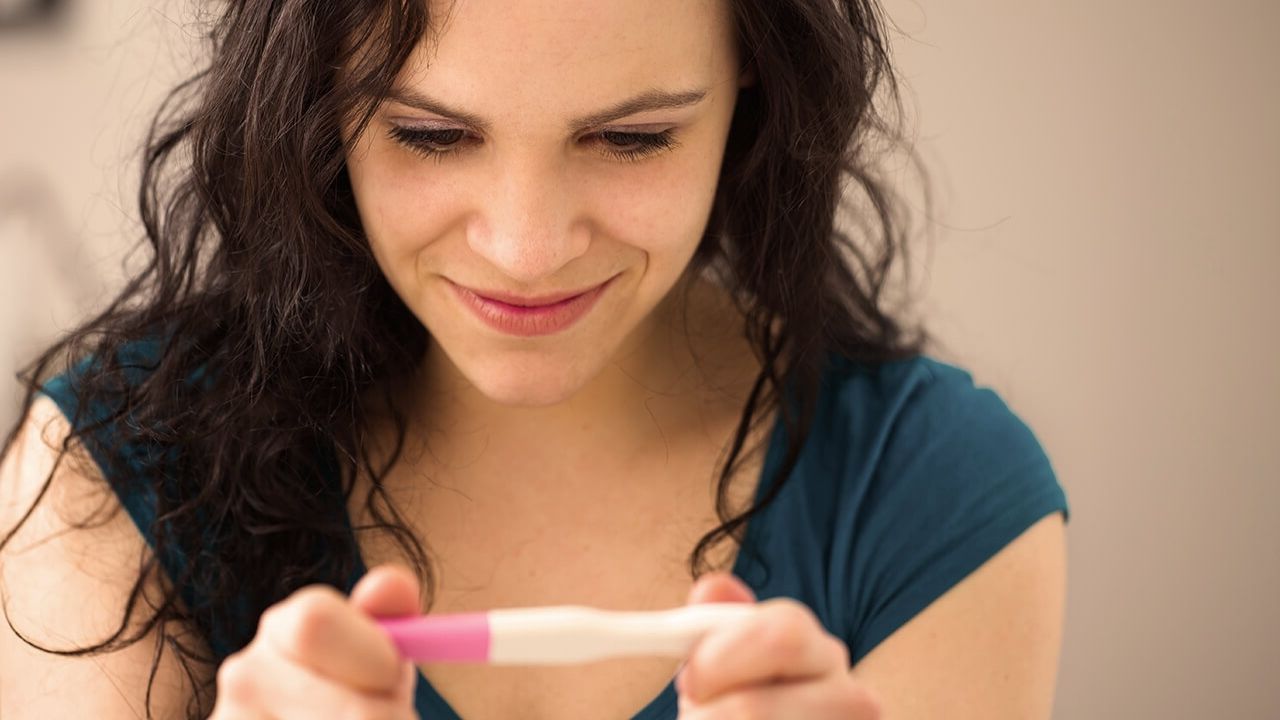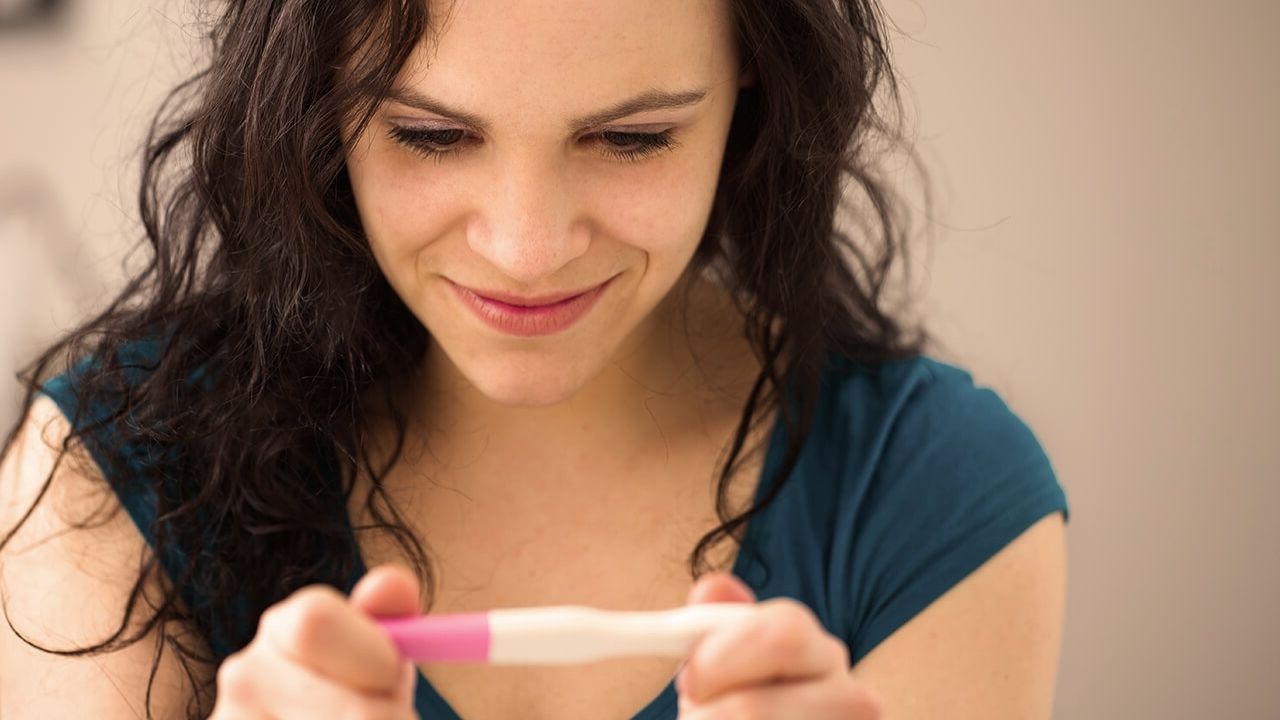Symptoms of pregnancy- sometimes it is impossible to unambiguously interpret the signals that your own body sends you. And if you have a suspicion that you may be pregnant, then, of course, you want to know for sure. This article is for you – it describes the early signs of pregnancy. Keep in mind that you may not be experiencing all symptoms. A home pregnancy test and / or a visit to your gynecologist will most likely give you the ultimate clarity if you are pregnant or not.

The first signs and symptoms of pregnancy
Every pregnancy is unique. But many mothers confirm the fact that pregnancy can make itself felt even before the delay in menstruation. Here are some early pregnancy symptoms:
- Delayed menstruation. One of the earliest signs of pregnancy is a missed period. However, if you have an irregular menstrual cycle, this symptom may not be very reliable.
- Implantation bleeding. Sometimes in early pregnancy, women notice spotting – this can be implantation bleeding, which occurs when a fertilized egg attaches to the lining of the uterus.
- Moderate drawing pains in the lower abdomen. Some expectant mothers in the first trimester of pregnancy experience pain that is similar to the feeling that the lower abdomen is being pulled. In this case, use a heating pad or take a warm bath.
- Hot flashes. Due to the increased levels of the pregnancy hormone progesterone and the accelerated metabolism, the body temperature can rise. Your body compensates for the increased temperature by sweating more.
- Cardiopalmus. Hormonal changes can also cause heart palpitations. If your heart palpitations last for more than a few seconds or occur regularly, see your doctor to make sure everything is okay.
- Mood changes. The news of pregnancy is a major milestone, and it’s natural to experience a full range of emotions, from joy and excitement to anxiety and confusion. Share your experiences with loved ones, it can bring relief.
- Bloating and constipation. The digestive system can slow down at your usual pace, and as a result, you may experience bloating and constipation. Include high fiber foods in your diet, drink plenty of water, and exercise more.
- Heartburn. Pregnancy hormones weaken the valve that separates the stomach from the esophagus. Because of this, a small amount of gastric juice enters the esophagus, irritating it, while the expectant mother begins to suffer from heartburn. Eat small meals regularly, and avoid fried and spicy foods, as well as citrus fruits and chocolate.
- Acne. Increased sebum production during pregnancy can lead to acne. Cleanse your skin gently daily, use light- textured creams, and consult your doctor if necessary which acne medications are safe for pregnancy.
- Dizziness. Low blood sugar, stress and fatigue can cause dizziness or fainting. Eat small meals regularly and try to minimize sources of stress.
- Weight gain. Some mothers-to-be gain from 0.5 to 2 kg in the first few months of pregnancy. Your doctor can tell you more about healthy weight gain during pregnancy and can work out how much extra pounds is right for you.
- Nasal congestion. In early pregnancy, the nasal mucous membranes may swell and dry out and you may feel a stuffy nose. Flush your nose with salt water solutions and drink enough water. You can use a humidifier to humidify the air in a room, such as a bedroom.
- Headache. Headaches in early pregnancy can occur when estrogen levels rise, or because of stress or fatigue. Talk to your doctor about which headache medications are safe to take during pregnancy. In many cases, this can be paracetamol.
- Frequent urination. If you start to go to the toilet a lot, it could be a sign of pregnancy. Frequent urination during early pregnancy is due to the fact that the kidneys process more fluid. However, do not cut back on the amount of water you drink, as it is very important for you to stay hydrated.
- Breast tenderness, enlargement. At the beginning of pregnancy, you may experience breast tenderness and larger breasts. As your body adjusts to the hormonal changes, the discomfort is likely to diminish.
- Nausea (toxicosis). The classic symptom of pregnancy. Nausea often starts about a month after you get pregnant. In some women, nausea occurs mainly in the morning, while in others, at different times of the day. Some lucky ones don’t get nauseous at all. If you have morning sickness, try to eat something before getting out of bed and eat small meals throughout the day to keep your blood sugar stable.
- Cravings or aversion to food and sensitivity to odors. Changes in taste, sensitivity to odors, cravings for certain foods, and a sudden aversion to others can all be signs of pregnancy. Eat a balanced diet and talk to your doctor if you are drawn to inedible foods (such as chalk or dirt).
- Fatigue and fatigue. Feeling tired during pregnancy is natural, especially in the early stages. Your body is actively working to support your baby’s development. Leave enough time in your schedule to rest and relax.
- Skin changes. You may notice changes in skin pigmentation: darkening of the skin around the nipples, dark spots on the face, or the appearance of a dark streak from the navel to the pubic bone. But usually this symptom appears later in pregnancy.
Do all women show early pregnancy symptoms?
Every mom-to-be and every pregnancy is unique. You may only experience some of the early signs of pregnancy. Someone notices some signs of pregnancy even before the delay in menstruation, and for someone it is the delay that becomes the first sign of pregnancy. What’s more, the symptoms of a second pregnancy may be different from those you experience the first time.
If you suspect you are pregnant, take a home pregnancy test first. If the test is negative but you continue to experience pregnancy symptoms, repeat the test a week later. If the test is positive, make an appointment with your doctor to confirm the pregnancy. You can use pregnancy calculator to calculate your due date .
Other pregnancy symptoms you may experience
Throughout your pregnancy, strange and wonderful things will happen to your body. Some of the physical manifestations (such as nausea) may go away, while others (such as nasal congestion and heartburn) may persist throughout the pregnancy. Here are some of the manifestations you may experience in the second and third trimesters:
- Allocations. Clear or white vaginal discharge is normal during pregnancy. However, if you develop a strong-smelling discharge or are accompanied by painful itching, this is a reason to see your doctor.
- Cramps or pain in the lower abdomen. Later in pregnancy, you may experience cramps in the lower abdomen. They can be associated with pain in the round ligaments of the uterus or Braxton-Hicks training contractions .
- Back pain. Back pain during pregnancy can be caused by hormonal changes, weight gain, and changes in posture due to a growing belly. For back health and pain relief, maintain posture, sleep on your side, and exercise.
- Frequent urination. While the frequent urination you may experience in early pregnancy will likely subside in the second trimester, it may return by the third trimester. This is due to the fact that the baby presses on your bladder, as a result, you feel the urge to use the toilet more often.
- Itchy skin. In places where the skin is stretched (for example, on the abdomen and thighs), it may itch. Use a good moisturizer for your body and do not shower under hot water, as hot water dries out your skin.
- Breast changes. Breast tenderness and enlargement – symptoms that can occur during early pregnancy are just a few of the changes you may observe during pregnancy. Other possible changes include darkening of the nipples, stretch marks on the skin, and discharge from the breast in the third trimester .
- Stretch marks. As your skin stretches during pregnancy, stretch marks may appear on the skin. Typical places for stretch marks are the abdomen, thighs, buttocks, and breasts.
- Lack of air. Your baby may press on the diaphragm and lungs, making it difficult for you to breathe. Maintain your posture – a straight back and straightened shoulders create more space for your lungs to breathe fully.
- Pain and discomfort. At different stages of pregnancy, you may experience different manifestations of pregnancy. These can include toothache or tenderness in the gums, varicose veins or hemorrhoids, and leg swelling or calf cramps. Read more about this in the article “ What can hurt during pregnancy? “.
In most cases, physical discomfort and mild pain during pregnancy are normal. But there are dangerous symptoms that cannot be ignored. These include: severe headaches, changes in vision, or sudden swelling. If you notice something in your health that bothers you, be sure to see a doctor.
Symptoms and signs of pregnancy can sometimes be exhausting and even exhausting. But time will fly by, and the day of birth will come – the day when you take your baby in your arms.
